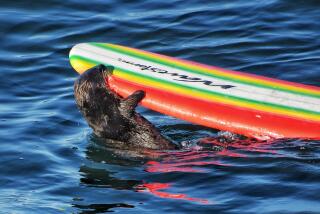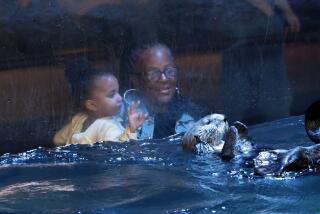Charlie, oldest southern sea otter at any zoo or aquarium, dies at 22
Charlie, the oldest living southern sea otter at any zoo or aquarium, died Monday. He was 22.
Long before Charlie was eating an endless supply of crabs and shrimp at the Aquarium of the Pacific in Long Beach, he was just a tiny pup trying to survive.
Charlie was found in 1997 stranded in Northern California, thought to be less than a day old. His umbilical cord was still attached.
He was taken to the Monterey Bay Aquarium. As was the practice two decades ago, humans serving as surrogate mothers would attempt to train orphaned pups how to survive in the wild. The program was unsuccessful, and it was determined Charlie would survive only in captivity. (Today, adult female otters serve as surrogates.)
The Aquarium of the Pacific wasn’t open yet but wanted to be the home for Charlie and another young stranded otter, Brook, who would become one of Charlie’s closest friends.

For the next six months, Charlie and Brook lived off-site, being trained by Robert Mortensen, who now serves as the aquarium’s assistant curator.
Charlie is thought to have been orphaned because of the significant storms brought on by El Niño the year he was born. At the off-site facility, it quickly became clear that Charlie was afraid of thunder and lightning. As the storms rolled in, Charlie would latch onto Mortensen’s leg, in need of a security blanket.
“He was very unnerved by the whole rain season and just wanted that close contact to make him feel better,” Mortensen, 51, said.
Mortensen spent every day with the two otters, and quickly learned that young Brook was more ornery, often sneaking off to roll around in an ice bin until Mortensen caught her. She would act like she was going to bite him if he pulled her out.
Charlie was more gentle. The 20-pound pup would sit at Mortensen’s feet as Mortensen read him “National Geographic” and “Golf Digest” magazines, an exercise that taught Charlie to be calm around human voices.
Once the aquarium opened, Mortensen knew he could count on reliable Charlie. Mortensen used Charlie to teach the new trainers how to interact with the otters. Charlie would let them open his ears, nose and mouth without any complaint. And for that, he was rewarded mightily.
“Charlie liked scallops, so we’d go out and buy him scallops,” Mortensen said. “He liked king crab, so we’d go out and buy him king crab.”
Charlie was the first otter in the world to give a voluntary blood sample without sedation, which was significant because when otters are sedated to get blood drawn, it changes the animal’s blood chemistry.
To get Charlie to participate, trainers worked with him for about a year. Otters are generally more like cats than dogs and are impatient and not good with pain, Mortensen said. The aquarium staff presented a paper to their colleagues on what they learned from the blood-draw process with Charlie.
The otter also contributed to a scientific experiment that helped researchers learn how well otters could hear.
For that study, Charlie went into an acoustic chamber, listening for sound signals and responding to the researchers on whether he heard the sound by touching his nose to a target or remaining still. The study, through UC Santa Cruz’s Long Marine Lab, helped inform decisions made by government agencies regarding ocean noise.
Charlie celebrated his 22nd birthday with an edible seafood cake on March 2. He is the second sea otter on record to reach that age. His fellow otter Brook, 21, died Jan. 29 after being diagnosed with congestive heart failure.
Charlie had started to show typical signs of aging, with diminished vision and hearing, and some arthritis.
He is remembered by aquarium staff and guests for his intelligence and easygoing disposition. He was often seen relaxing in the exhibit sucking on his paw, a habit he had since he was a pup, Mortensen said.
Mortensen, who has worked at the aquarium for 22 years, said he feels like he lost a fellow training partner. Charlie set the standard for what it meant to be a great otter.
“I just feel blessed to have had an animal that was that great that came our way,” Mortensen said.
More to Read
Sign up for Essential California
The most important California stories and recommendations in your inbox every morning.
You may occasionally receive promotional content from the Los Angeles Times.











